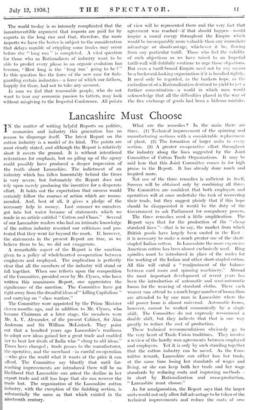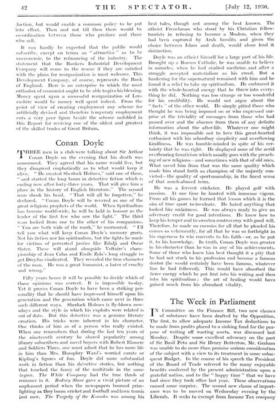Lancashire Must Choose
TN the matter of writing helpful Reports on polities, economics and industry this generation has no reason to disparage itself. The latest Report on the cotton industry is a model of its kind. The points are most clearly stated, and although the Report is relatively short it covers the ground. It is without intentional reiterations for emphasis, but no piling up of the agony could possibly have produced a deeper impression of the truth about Lancashire. The indictment of an industry which has fallen lamentably behind the times is very severe, but fortunately the Report does not rely upon merely producing the incentive for a desperate effort. It holds out the expectation that success would certainly follow the courses of action which are recom- mended. And, best of all, it gives a pledge of the necessary help in money. Last summer we ourselves got into hot water because of statements which we made in an article entitled " Cotton and Chaos." Several of our Lancashire readers who had an intimate knowledge of the cotton industry resented our criticisms and pro- tested that they went far beyond the mark. If, however, the statements in the present Report are true, as we believe them to be, we did not exaggerate.
A remarkable aspect of the Report is the sanction given to a policy of wholehearted co-operation between employers and employed. The implication is perfectly clear that all the members of the industry will stand or fall together. When one reflects upon the composition of the Committee, presided over by Mr. Clynes, who have written this unanimous Report, one appreciates the significance of the sanction. The Committee have got right away from the dreadful ideas of" killing Capitalism " and carrying on " class warfare."
The Committee were appointed by the Prime Minister eleven months ago, and in addition to Mr. Clyncs, who became Chairman at a later stage, the members were Mr. A. V. Alexander, of the present Cabinet, Sir Alan Anderson and Sir William MeLintock. They point ont that a hundred years ago Lancashire's readiness to adopt new ideas gained her a great trade and enabled her to beat her rivals of India who "clung to old ideas." Times have changed ; trade passes to the manufacturer, the operative, and the merchant—in careful co-operation --who give the world wlutt it wants at the price it can afford. The Committee say • bluntly that until far- reaching improvements are introduced there will be no likelihood that Lancashire can arrest the decline in her export trade and still less hope that she can recover the trade lost. The organization of the Lancashire cotton industry, with the exception of the finishing section, is substantially the same as that which existed in the nineteenth century. What are the remedies ? In the main there are three. (1) Technical iinprovetnent of the spinning and manufacturing sections with a considerable replacement of plant. (2) The formation of larger units in every section. (3) A greater co-operative effort throughout the industry along the lines suggested by the Joint Committee of Cotton Trade Organizations. It may he said here that this Joint Committee comes in for high praise in the Report. It has already done much and inspired more.
Not one of the three remedies is sufficient in itself. Success will be obtained only by combining all three. The Committee are confident that both employers and operatives will at once undertake the task or recovering their trade, but they suggest plainly that if this hope should be disappointed it would be the duty of the Government to ask Parliament for compulsory powers.
The three remedies need a little amplification. The Report says that for the production of the " cheap standard lines "—that is to say, the market from which British goods have largely been ousted in the East -- it is necessary to make a much greater use of the short- stapled Indian cotton. In Lancashire the more exFensive American cotton has been almost exelusivtly used. Ring spindles mast be introduced in place of the mules for the working of the Indian and other short-stapled cotton. All this will entail a " readjustment or the balance between card room and spinning machinery." Abroad. the most important development of recent years has been the introduction of automatic and semi-automatic looms for the weaving of standard cloths. There cacti weaver can attend to a much larger number of looms than are attended to by one man in Lancashire where the old power loom is almost universal. Automatic looms, however, cannot be worked economically by a single shift. The Committee do not expressly recommend a double shift, but they indicate that that is one way greatly to reduce the cost of production.
These technical recommendations obviously go to the very heart of Trade Union traditions. They involve a review of the hardly won agreements between employed and employers. Yet it is only by such standing together that the cotton industry can be saved. As the Com- mittee remark, Lancashire can either lose her trade, at the sante time losing her standards of wages and living, or she can keep both her trade and her wage standards by reducing costs and improving methods— lit short by Rationalization and mass-production. "Lancashire must choose."
As for amalgamation, the Report says that the larger units would not only allow full advantage to be taken of the technical improvements and reduce the costs of two- duction, but would enable a common policy to be put into effect. Then and not till then there would be co-ordination between those who produce and those who sell.
It can hardly be expected that the public would subscribe, except on terms so " attractive " as to be uneconomic, to the refinancing of the industry. The statement that the Bankers Industrial Development Company will come to the rescue if they are satisfied with the plans for reorganization is most welcome. This Development Company, of course, represents the Bank of England. Here is an enterprise to which the most orthodox of economist ought to be able to give his blessing. Money spent upon a successful reorganization of Lan- cashire would be money well spent indeed. From the point of view of creating employment any scheme for artificially devised and therefore temporary employment cuts a very poor figure beside the scheme unfolded in this Report for reviving one of the oldest and greatest of the skilled trades of Great Britain.





































 Previous page
Previous page